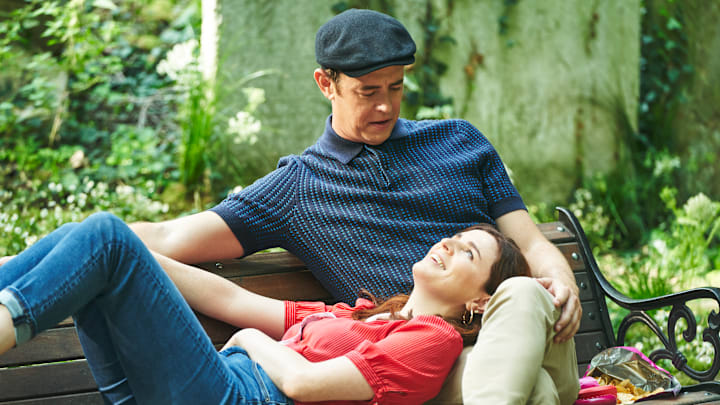Of And Mrs., I can say that I almost made it to the end of the movie without crying and I was surprised that it took that long. It is a film with a quirky premise that works because the absurd circumstances are presented to characters who prove themselves equipped to deal with such things.
"No proper way to grieve"
The first thing that rendered this movie effective is that the trailer got it wrong. It chronologically told us that we would meet a couple, see them divided by death, and then see the way that the family and friends rally around the woman left in limbo. The immediacy of the loss Gemma (Aisling Bea) suffers is instead quite literal. She flirts with her beloved, Nathan (Colin Hanks), goes for a run, helps her neighbor up the stairs, and comes back to find that Nathan has suffered a "paradoxical embolism" in the time she's been gone.

Curious about this description, I looked it up and found that it merely means that there is an "Uncommon cause." This sets the stage for the various storylines all of which have an uncommon cause. Billie Lourd plays Audrey, Nathan's peripatetic younger sister who flies too often by the seat of her pants, but is the emotional rock. Gemma's mother (Sinead Cusack) is the voice of mortification who feels compelled to remind everyone, from the bride to the bawdy bridal shop assistant, that the groom is dead and that weaves a powerful need for emotional reconciliation by the end. Throughout it all, Colin Hanks appears in both flashbacks and as a present advisor who is the "uncommon cause" for Gemma needing to find both fulfillment and closure.
Melissa Bubnic's screenplay doesn't expect the audience to stay a steady emotional course, and the beauty of that is that it allows us to stand in for Gemma. There is a Herculean effort of Gemma and Audrey to persuade the Lord Chief Justice to approve an act of necrogamy and the hen night intervention that exposes deep-seated problems between friends and family. On the other hand, we have the pub owner who won't stop advertising his establishment while discussing the tragedy, and Arthur Darvill playing an American best friend whose strength lies in his willingness to be embarrassing. In one of my favorite scenes, Gemma runs out to track someone down across London for a heartfelt discussion, and finds that the chase is very short because the person couldn't get an Uber. None of these people make much sense individually, but the story wouldn't work if they did.
"Unfortunate bond"
Reisinger mentioned in a statement to press that many of the cast and crew had lost someone close to them and that this gave them all an "Unfortunate bond." It comes through in the rawness and obvious personal connection of various characters' depictions of mourning.
He went on to say that "post-pandemic, now more than ever, we need stories like AND MRS that let us laugh through the grief." I mentioned having almost gotten through the movie without crying and while the culmination of the plot got me to that point, I openly wept when the credits paid tribute to the loved ones lost by the cast and crew. Reisinger's story of there being no perfect way to grieve is moving to the end and the humanity of it all is why.
